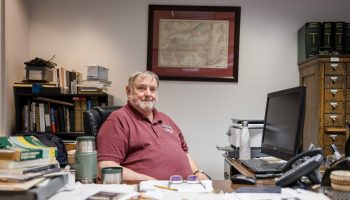Kaitlyn Finchler
Contributing Writer

Living in a capitalist society, German sociologist Max Weber couldn’t have predicted the landscape of American consumerism now when his book The Protestant Ethic and the Spirit of Capitalism was published in 1904.
Diane Winston, professor of journalism and communication at the University of Southern California and Knight Chair in Media and Religion, will deliver her lecture “Jesus Saves … and Spends: the Protestant Ethic and the Spirit of Capitalism in 2025” at 2 p.m. today in the Hall of Philosophy for the Week Five Interfaith Lecture Series theme, “The Spirit of Capitalism: Prosperity and the Enduring Legacy of the Protestant Work Ethic.”
“I’m interested in how Max Weber’s Protestant Ethic and the Spirit of Capitalism applies to today,” Winston said. “He wrote this in 1904, and 121 years later, I want to think through with the audience what still holds true and why have things changed.”
Weber made the argument that Calvinism shaped American capitalism in very specific ways, Winston said.
“It created a challenge because as people accumulated money, Calvinism taught them the accumulation in itself was evidence of God’s glory, but spending it was worldly — and thus, not the proper religious thing to do,” she said.
While this may have made sense in the 17th century where there was not a commercial and consumer market that produced goods and opportunities that were “attractive” to people, Winston said as capitalism succeeded, “just accumulating money” did not satisfy people.
“By the 21st century, where we are now, the idea of a Calvinist perspective of acquiring money just to show that we have God’s blessing … didn’t ring true for most people,” Winston said.
How people spend their money and how they think about money reflects their values, she said.
“Weber … was making a point that economics and religion are tied together, for this very reason, because what you do with your money says something about what’s important to you,” Winston said.
In the Puritan era, Winston said the “whole point” of accumulating money was not about what money could buy, but the recognition “that God was showing favor” to those who succeeded in the world, materially.
“In other words, it wasn’t about what the money could buy,” she said. “It was the very fact of making the money and that was enough. Today, the spirit of Calvinism is not particularly strong in the U.S., and we have very different ideas about the value of money. Most of the time, they don’t have a lot to do with God or divine intentions.”
Winston said she wants Chautauquans to think about what’s important to them, what they do with their money and what values they want to reflect through the way they spend their money.
When Weber wrote The Protestant Ethic and the Spirit of Capitalism, Winston said he had “no idea” of the hypercapitalism “we would begin to see” in the 1980s.
“The welfare liberalism of the ’30s, ’40s, ’50s (and) ’60s, to the neoliberalism of the (1980s and 1990s) gave us capitalism on steroids,” she said. “What I want to do is try to account for the religious and cultural changes that accompanied those economic changes, and that’s something Weber could never have imagined.”
From her perspective, Winston said these changes have had a “detrimental effect” on spiritual and religious life, both collectively and individually. It’s interesting to her that Weber, a “long-dead sociologist,” can be used to think through “some of the most salient problems of our day and age.”
“The linking of religion and economics could be a way to help us understand and even move through the current moment,” Winston said. “Because the problems we’re facing, the problems our nation is facing, today are both economic and spiritual.”




